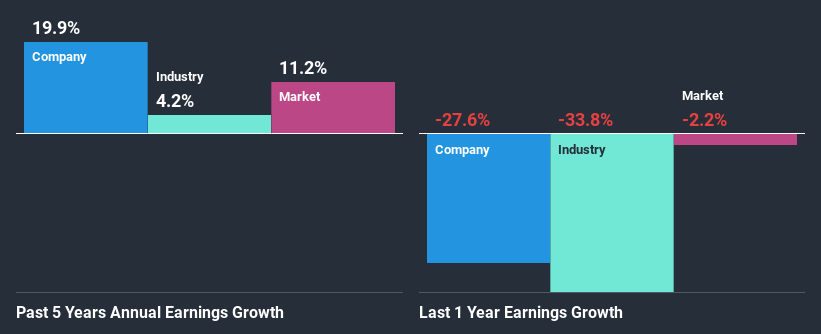Is PSC Insurance Group Limited's (ASX:PSI) Recent Stock Performance Influenced By Its Financials In Any Way?

PSC Insurance Group's (ASX:PSI) stock is up by 5.4% over the past three months. We wonder if and what role the company's financials play in that price change as a company's long-term fundamentals usually dictate market outcomes. Particularly, we will be paying attention to PSC Insurance Group's ROE today.
Return on Equity or ROE is a test of how effectively a company is growing its value and managing investors’ money. Simply put, it is used to assess the profitability of a company in relation to its equity capital.
See our latest analysis for PSC Insurance Group
How Do You Calculate Return On Equity?
Return on equity can be calculated by using the formula:
Return on Equity = Net Profit (from continuing operations) ÷ Shareholders' Equity
So, based on the above formula, the ROE for PSC Insurance Group is:
7.7% = AU$19m ÷ AU$245m (Based on the trailing twelve months to June 2020).
The 'return' is the amount earned after tax over the last twelve months. So, this means that for every A$1 of its shareholder's investments, the company generates a profit of A$0.08.
Why Is ROE Important For Earnings Growth?
So far, we've learned that ROE is a measure of a company's profitability. We now need to evaluate how much profit the company reinvests or "retains" for future growth which then gives us an idea about the growth potential of the company. Assuming everything else remains unchanged, the higher the ROE and profit retention, the higher the growth rate of a company compared to companies that don't necessarily bear these characteristics.
PSC Insurance Group's Earnings Growth And 7.7% ROE
When you first look at it, PSC Insurance Group's ROE doesn't look that attractive. However, given that the company's ROE is similar to the average industry ROE of 9.5%, we may spare it some thought. Having said that, PSC Insurance Group has shown a modest net income growth of 20% over the past five years. Taking into consideration that the ROE is not particularly high, we reckon that there could also be other factors at play which could be influencing the company's growth. For example, it is possible that the company's management has made some good strategic decisions, or that the company has a low payout ratio.
Next, on comparing with the industry net income growth, we found that PSC Insurance Group's growth is quite high when compared to the industry average growth of 4.2% in the same period, which is great to see.

The basis for attaching value to a company is, to a great extent, tied to its earnings growth. The investor should try to establish if the expected growth or decline in earnings, whichever the case may be, is priced in. By doing so, they will have an idea if the stock is headed into clear blue waters or if swampy waters await. Is PSI fairly valued? This infographic on the company's intrinsic value has everything you need to know.
Is PSC Insurance Group Making Efficient Use Of Its Profits?
The high three-year median payout ratio of 84% (or a retention ratio of 16%) for PSC Insurance Group suggests that the company's growth wasn't really hampered despite it returning most of its income to its shareholders.
Moreover, PSC Insurance Group is determined to keep sharing its profits with shareholders which we infer from its long history of five years of paying a dividend. Existing analyst estimates suggest that the company's future payout ratio is expected to drop to 54% over the next three years. As a result, the expected drop in PSC Insurance Group's payout ratio explains the anticipated rise in the company's future ROE to 14%, over the same period.
Conclusion
Overall, we feel that PSC Insurance Group certainly does have some positive factors to consider. That is, quite an impressive growth in earnings. However, the low profit retention means that the company's earnings growth could have been higher, had it been reinvesting a higher portion of its profits. With that said, the latest industry analyst forecasts reveal that the company's earnings growth is expected to slow down. To know more about the company's future earnings growth forecasts take a look at this free report on analyst forecasts for the company to find out more.
If you decide to trade PSC Insurance Group, use the lowest-cost* platform that is rated #1 Overall by Barron’s, Interactive Brokers. Trade stocks, options, futures, forex, bonds and funds on 135 markets, all from a single integrated account. Promoted
If you're looking to trade PSC Insurance Group, open an account with the lowest-cost platform trusted by professionals, Interactive Brokers.
With clients in over 200 countries and territories, and access to 160 markets, IBKR lets you trade stocks, options, futures, forex, bonds and funds from a single integrated account.
Enjoy no hidden fees, no account minimums, and FX conversion rates as low as 0.03%, far better than what most brokers offer.
Sponsored ContentNew: Manage All Your Stock Portfolios in One Place
We've created the ultimate portfolio companion for stock investors, and it's free.
• Connect an unlimited number of Portfolios and see your total in one currency
• Be alerted to new Warning Signs or Risks via email or mobile
• Track the Fair Value of your stocks
This article by Simply Wall St is general in nature. It does not constitute a recommendation to buy or sell any stock, and does not take account of your objectives, or your financial situation. We aim to bring you long-term focused analysis driven by fundamental data. Note that our analysis may not factor in the latest price-sensitive company announcements or qualitative material. Simply Wall St has no position in any stocks mentioned.
*Interactive Brokers Rated Lowest Cost Broker by StockBrokers.com Annual Online Review 2020
Have feedback on this article? Concerned about the content? Get in touch with us directly. Alternatively, email editorial-team@simplywallst.com.
About ASX:PSI
PSC Insurance Group
Provides diversified insurance services in Australia, the United Kingdom, rest of Asia, Hong Kong, New Zealand, Ireland, Bermuda, and Vietnam.
Excellent balance sheet with limited growth.
Market Insights
Community Narratives



